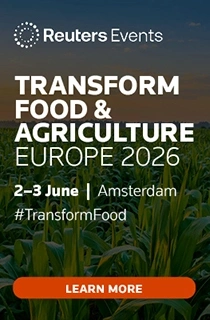
- Industry news
Industry news
- Category news
Category news
- Reports
- Key trends
- Multimedia
- Journal
- Events
- Suppliers
- Home
- Industry news
Industry news
- Category news
Category news
- Reports
- Key trends
- Multimedia
- Events
- Suppliers
Kraft Foods Shares Global Vision for Agriculture at Davos
30 Jan 2012

World Economic Forum "New Vision for Agriculture" Initiative Aims to Increase Food Production by 20% While Decreasing Poverty and Emissions by 20% Every Decade. The New Vision for Agriculture is a public-private initiative designed to transform agriculture through greater and smarter investment. The new report shares insights from the last year's work driving agricultural transformations in Vietnam, Indonesia, Mexico and Tanzania.
Jan 30 2012 --- Kraft Foods, which has co-chaired the World Economic Forum's New Vision for Agriculture initiative for the past year, have shared a new report from the project team. The New Vision for Agriculture is a public-private initiative designed to transform agriculture through greater and smarter investment. The new report shares insights from the last year's work driving agricultural transformations in Vietnam, Indonesia, Mexico and Tanzania. The goal of the report is to help other nations begin their own transformations.

"It's clear that agriculture, done right, is the best means the world has today to simultaneously tackle food security, poverty and environmental degradation," said Irene Rosenfeld, Chairman and CEO of Kraft Foods, who co-chaired today's session in Davos where the new report was launched. "From our own work in cocoa, coffee and cashews to the work of more than 25 other companies that have joined this initiative, we're catalyzing innovative agricultural transformations around the globe. But the private sector can't do it alone. We must continue working together with national governments, multilateral institutions, civil society and farmers to create lasting change."
In response to global food crises, in early 2009 several World Economic Forum companies saw a clear and compelling need – and an opportunity – to improve food security in a meaningful way. By investing in agriculture, companies saw they could also address two of the world's other most pressing problems: poverty and environmental degradation.
That's how the New Vision for Agriculture initiative began. Its goals are to increase food production by 20 percent each and every decade, while decreasing carbon dioxide emissions and reducing poverty by 20 percent in the same time span.
New Vision for Agriculture projects are delivering solid results on the ground in countries such as Vietnam, Indonesia, Mexico and Tanzania. In Vietnam, for example, work is literally beginning to bear fruit. Vietnamese farmers in pilot projects expect to boost fruit and vegetable yields 30 percent in 2012 and 100 percent by 2014. In another project, tea farmers achieved a 30 percent increase in the amount of Rainforest Alliance-certified tea, improving livelihoods and using resources more efficiently.
Still, participants in the New Vision for Agriculture initiative realize that there's much more work to be done. There are many more crops where progress is needed, many more countries and many more partners to engage to have a truly global impact.
All content and features on this website are copyrighted with all rights reserved. The full details can be found in our privacy statement
Subscribe to our newsletters
By continuing to browse our site you agree to our Privacy Statement









